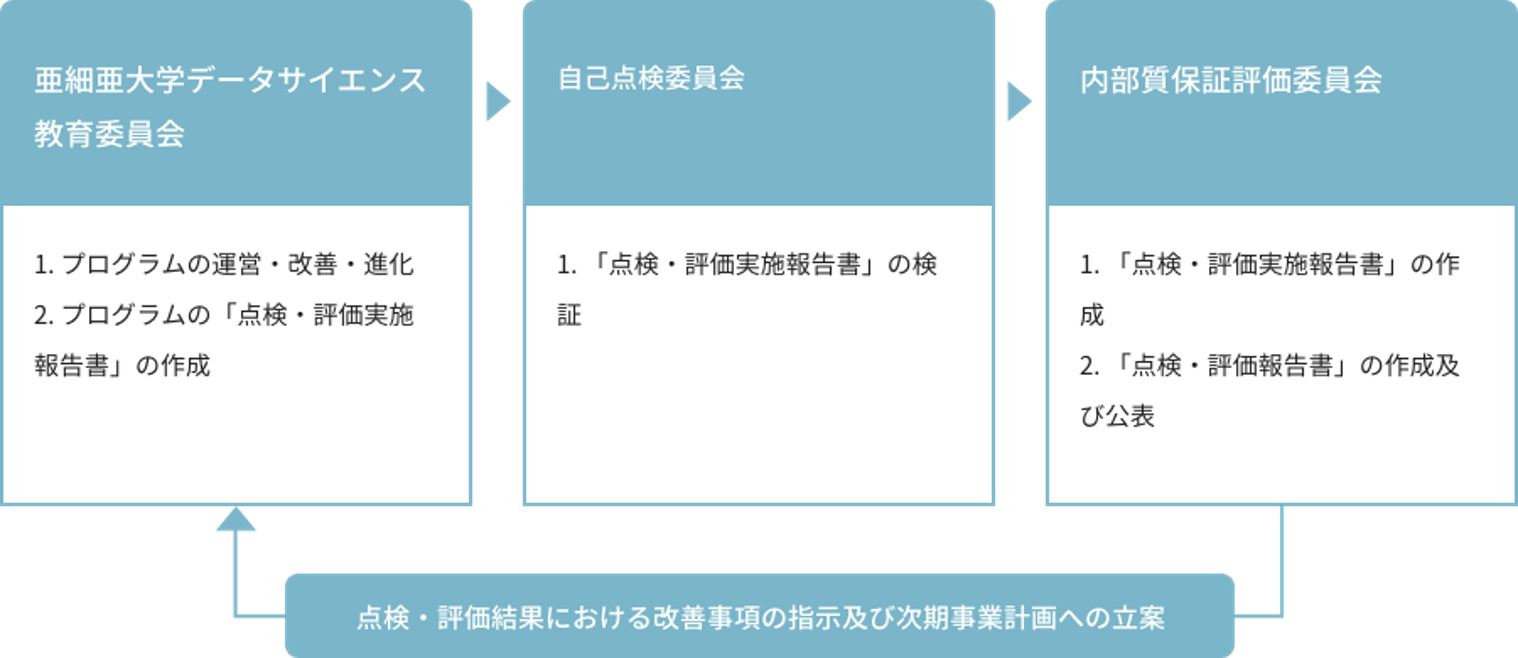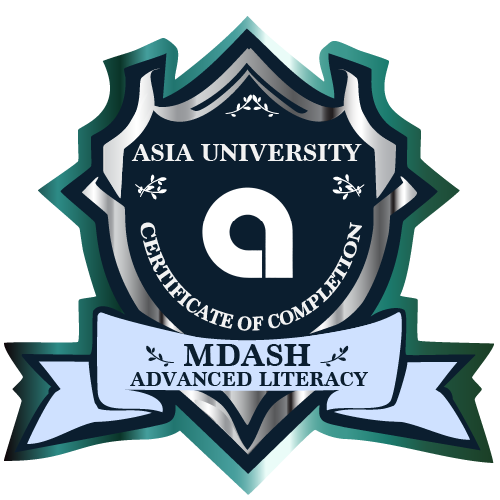- Asia University
- Faculty
- How to study at Asia University
- Sub-major system
- Data Science Minor
Data Science Minor
PAGE SECTIONS
Asia University MDASH Literacy/Application Foundation Program
These programs have been certified as having the literacy level and applied foundation level of the Ministry of Education, Culture, Sports, Science and Technology's "Mathematics, Data Science and AI Education Program," and are open to students from all faculties and departments.Literacy level
![[Deadline for literacy level certification]](/albums/109/abm00000233.jpg)
[Deadline for literacy level certification]
Until March 31, 2026
Mathematics, Data Science, and AI Education Program Certification System (Literacy Level) Application Form Change Notification
Applied basic level
![[Deadline for Applied Basic Level Certification]](/albums/109/abm00000234.jpg) [Applied basic level certification deadline]
[Applied basic level certification deadline]Until March 31, 2027
Mathematics/Data Science/AI Education Program Certification System (Applied Basic Level) Application Form Change Notification
Related Links
①What is Asia University MDASH Literacy Program?
Asia University offers a course called "Information and Society I" that allows students to efficiently learn basic knowledge about mathematics, data science, and AI, separate from the educational programs of their respective faculties. This course is designed to allow students to systematically learn knowledge related to data science, and is available to students from all faculties. Completion of this program will be verified by submitting a "certificate of completion" showing that you have completed "Information and Society I.""Information and Society I"
In accordance with the Ministry of Education, Culture, Sports, Science and Technology's model curriculum for mathematics, data science and AI (literacy level), classes will be conducted in three parts as follows:Introduction section: Participants will work in groups to collect examples of data and AI use and give presentations.
Basics section: Analyze actual data using the spreadsheet software MS-Excel and visualize the results.
Knowledge Section: Participants will hold a group discussion on the challenges posed by data and AI, and present the results.
Through this STEM (science, technology, engineering, and mathematics) education, students in liberal arts fields will develop the basic skills necessary to apply data science to a range of issues, from business to environmental issues.
②What is Asia University MDASH Applied Foundation Program?
Asia University MDASH Applied Foundation Program is a program designed to systematically learn knowledge about data science, which has played an important role in many industrial fields in recent years, and is open to students from all faculties (students in Data Science Minor and Department of Data Science). Students who earn 20 or more Credit from the designated subject groups will be awarded a certificate of completion.③What is Data Science Minor
Data Science Minor is a minor designed to enable you to systematically learn knowledge about data science, which has played an important role in many industrial fields in recent years, by taking courses in Asia University MDASH Applied Fundamentals Program. . Students from all faculties except Department of Data Science Faculty of Business Administration can take this course*.
Students who earn 20 Credit more credits from a designated subject group will receive a certificate of completion upon graduation.
*Students Department of Data Science can take courses in the same program without enrolling in a minor.
Students who earn 20 Credit more credits from a designated subject group will receive a certificate of completion upon graduation.
*Students Department of Data Science can take courses in the same program without enrolling in a minor.

④ Ideal talent
Asia University MDASH Literacy Program equips students with the basic knowledge to use mathematics, data science, and AI in their daily lives and at work, and cultivates talent that can make appropriate human-centered decisions and explain them in the digital society of the future, as well as analyze problems and link them to solutions.To achieve this, we have adopted an educational method that not only teaches the basics of data analysis, but also develops problem analysis and problem-solving skills through small group discussions.
Asia University MDASH Applied Foundation Program cultivates talent who can not only statistically analyze data from a perspective that combines the humanities and sciences, but also analyze problems and link them to problem-solving using methods such as artificial intelligence (AI).To this end, we have adopted a curriculum that not only teaches the basics of statistics and programming, but also emphasizes the development of problem-analysis and problem-solving skills through project-based Seminar in small groups.
Asia University MDASH Applied Foundation Program cultivates talent who can not only statistically analyze data from a perspective that combines the humanities and sciences, but also analyze problems and link them to problem-solving using methods such as artificial intelligence (AI).To this end, we have adopted a curriculum that not only teaches the basics of statistics and programming, but also emphasizes the development of problem-analysis and problem-solving skills through project-based Seminar in small groups.

⑤ Skills that can be acquired
- In addition to being able to statistically analyze data from an interdisciplinary perspective, it is also possible to analyze problems and use methods such as artificial intelligence (AI) to solve them.
- Humanities students can acquire the basic skills to apply data science from business to environmental problems.
- Acquire basic data science methods, select appropriate analysis methods and algorithms for a given data set at your own discretion, perform analysis, and be able to interpret the results.
- Understand the basic techniques of artificial intelligence, machine learning, and deep learning and be able to apply them to real-world problems.
- Acquire the mindset to solve unknown problems using data science methods.
Curriculum
Data Science Minor subject group begins with subjects that study mathematics and statistics, which also serves as a review of high school, background natural science, and information ethics.In the core course "Introduction to Data Science", students learn the basics of data analysis programming using the programming language Python, and learn conventional methods such as regression analysis and clustering using actual data obtained from the Internet of Things (IoT). , machine learning, and the latest techniques such as deep learning.
Furthermore, in the "Data Science Application Projects I and II", project-based Seminar on artificial intelligence (AI) and virtual reality (VR) will be conducted. Through these STEM education, liberal arts students develop the basic skills to apply data science to everything from business to environmental issues.
Furthermore, in the "Data Science Application Projects I and II", project-based Seminar on artificial intelligence (AI) and virtual reality (VR) will be conducted. Through these STEM education, liberal arts students develop the basic skills to apply data science to everything from business to environmental issues.

2025 curriculum
[1st year] Study mathematics and statistics as a review of high school
[2nd year] Practicum data analysis using the programming language Python
[3rd and 4th years] Project-type Seminar in small groups on artificial intelligence (AI) and virtual reality (VR).
[2nd year] Practicum data analysis using the programming language Python
[3rd and 4th years] Project-type Seminar in small groups on artificial intelligence (AI) and virtual reality (VR).
| background knowledge | mathematical method | statistical method | programming | application | |
| [3rd and 4th year] development |
Introduction to Artificial Intelligence I Introduction to Artificial Intelligence II | ||||
| [2nd year] Basic/Application | Introduction to data science Spreadsheets and data science |
Programming language I programming language II |
|||
| [1st year] introduction |
Information and Society I Introduction to Natural Sciences II |
Introductory Mathematics I Introductory Mathematics II |
Introduction to Statistics I Introduction to Statistics II |
||
(2) By acquiring 20 or more Credit from the above-mentioned subject groups, including "Information and Society I," "Introduction to Statistics I," "Spreadsheets and Data Science," and "Introduction to Data Science," and fulfilling Requirement for Graduation, you will meet Requirement for Completion of the Graduate School Asia University MDASH Applied Foundation Program.
Subject
SubjectCorrespondence with the model curriculum
Correspondence table between model curriculum and implemented subjectsImplementation system
| Committee organization name | role |
| Asia University Data Science Board of Education | (1) Operation, improvement and evolution of the program (2) Preparation of “Inspection/Evaluation Implementation Report” for the program |
| Self-inspection committee | (1) Verification of “Inspection/Evaluation Implementation Report” |
| Internal Quality Assurance Evaluation Committee | (1) Preparation of “Inspection/Evaluation Implementation Report” (2) Preparation and publication of “inspection/evaluation report” |

Self-check/evaluation
We will conduct self-inspection and evaluation each fiscal year and make the results public.FY2024 Inspection and Evaluation Report
FY2023 Inspection and Evaluation Report
FY2022 Inspection and Evaluation Report
FY2021 Inspection and Evaluation Report
FY2020 Inspection and Evaluation Report
open badge
As a completion certificate for our Asia University MDASH Applied Foundation Program, we will issue an "Open Badge," which is a type of digital certificate.Asia University MDASH Applied Foundation Program is a group of subjects designed to systematically learn knowledge about data science, which has played an important role in many industrial fields in recent years. It is proof of having acquired 20 or more Credit from the prescribed group of subjects at our university.
 △Open Badge for Asia University MDASH Applied Foundation Program
△Open Badge for Asia University MDASH Applied Foundation Program*1 The technical standards for open badges are set by the IMS Global Learning Consortium.
《Pick Up》Data Science Application Project Ⅰ・Ⅱ
Teacher in charge: HORI Gen
In small groups, we will conduct project-type Seminar on the themes of visualizing multidimensional data using virtual reality and programming drone control using artificial intelligence (AI). Each group envisions what they want to do with virtual reality and drones, and each group creates different virtual reality content and drone control programs.
In small groups, we will conduct project-type Seminar on the themes of visualizing multidimensional data using virtual reality and programming drone control using artificial intelligence (AI). Each group envisions what they want to do with virtual reality and drones, and each group creates different virtual reality content and drone control programs.

“Unity education” to increase future options
At Asia University, we have adopted the "Unity Education Curriculum" and are working on the development of AR apps for the iPhone using Unity's AR Foundation and Xcode, and the "Asia University Metaversity" campus digital twin project.Unity CASE STUDY <Case Study>
<Updated on August 20, 2025>